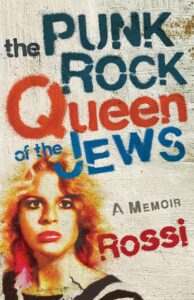At four years old, Slovah Davida Shana bas Hannah Rachel Ross — she prefers the simpler “Rossi” — was already irate about gender inequity in the synagogue, and she was vocal about it.

In the Bradley Beach, N.J. conservative synagogue her family attended, the men filed in up front beside the rabbi while the women hung back in silence. Women were annexed in a separate synagogue tower that was so stuffy and claustrophobic that they sometimes passed out there. Rossi didn’t understand how those dynamics were acceptable.
Where that child’s eye for injustice came from, Rossi says she can only guess: “I feel like I shot out of my mother’s vagina and said, ‘That’s wrong!’ ”
And while adolescence typically entails some struggles, they don’t usually involve being carted across state lines by your parents to live with a Hasidic rebbe who, as she puts it, “expertly deprogrammed the false gods out” of the kids in his care.
She’d become “Rossi” as a teen: “It was the perfect name for a girl in a punk-rock getup who drank booze from a coffee cup during lunch,” she writes in her new memoir, The Punk Rock Queen of the Jews, published on April 23 by She Writes Press. Led Zeppelin and Blondie were her adolescent soundtrack, though that was silenced during her two years in the Hasidic community.
She’s also DJ Rossi on WOMR. She has been coming to Provincetown since 1990 and says her righteous indignation has only solidified with age.
Then there’s “Chef Rossi,” based in Manhattan: 35 years ago, she founded the catering company The Raging Skillet. But she could just as easily be painter Rossi or writer Rossi. For years, she had a regular cooking column in Provincetown Magazine; her paintings have been exhibited in New York.
The memoir details how she wound up in a Crown Heights brownstone among the ultra-Orthodox in 1981. It may have had to do with being an intermittent smoker, or being gay, or her multiple childhood attempts to run away. At six, she funded her first abscondence by selling pears out of a pillowcase; the second time, she built a raft from wooden planks.

Hasidic Jews insist that women be tzniut (modest) — that they stay quiet and covered in the presence of men, and that they give birth to six or maybe twelve kids, says Rossi. That didn’t sit well with her. In the decades since, she says she’s embraced her own philosophy of Judaism: “If you keep kosher and you go to the synagogue every day and you wear a yarmulke but you’re hurting people, you’re going to a crappy place. If you eat ham and cheese on rye every day covered in shrimp but you’re nice to people, then you’re going to a good place.”
Rossi’s first book, The True Life Story of Chef Rossi, is about her culinary life and was adapted into a play performed at Wellfleet Harbor Actors Theater in 2018. “I used to think that my cooking life was the enemy of my creative life,” she says. “But then I realized that they could be best friends.”
For 20 years, Rossi hosted Bite This on WOMR. It’s gone from a cooking show to a less constricted one, Raging and Eating, that still includes a recipe, she says. It airs on Thursdays at 8 p.m.
Food also suffuses Rossi’s latest memoir. Reflecting on her teen years in Crown Heights, she realizes she had not “had a vegetable for two years, unless you count pickles.” As she cooks lasagna the way she learned to growing up (with grocery store ragu and cottage cheese), she has an inkling that there might be a better way. On her first time eating curry: “It was so good I started to tap my feet, almost dancing while I ate it,” she writes.
Rossi calls her food philosophy “anti-catering,” which means never sacrificing flavor for aesthetics. She’s had too many encounters with dishes that looked pretty but tasted like “you got on your hands and knees and licked the floor,” she says.
Among Rossi’s favorite catering triumphs was the after-party for a performance of The Vagina Monologues. “I fed the crowd a sea of vaginas,” Rossi writes. “Oval croutons with Korean barbecue beef folded in the center, a sprinkling of black seaweed.”
Provincetown crops up frequently in the new memoir. Her first trip here involved speeding through the night with a friend and arriving at daybreak. All they had for snacks was black bean salad. Rossi’s first morning in Provincetown was characterized by flatulence (which staved off much-needed sleep) and ensuing hysterics. Other guests at the inn, disturbed by the racket, banged angrily on their bedroom door.
And yet for Rossi it was a perfect first morning.
“It’s my favorite place in the world,” she says of Provincetown now. “It’s the place that sings inside my solar plexus.”



